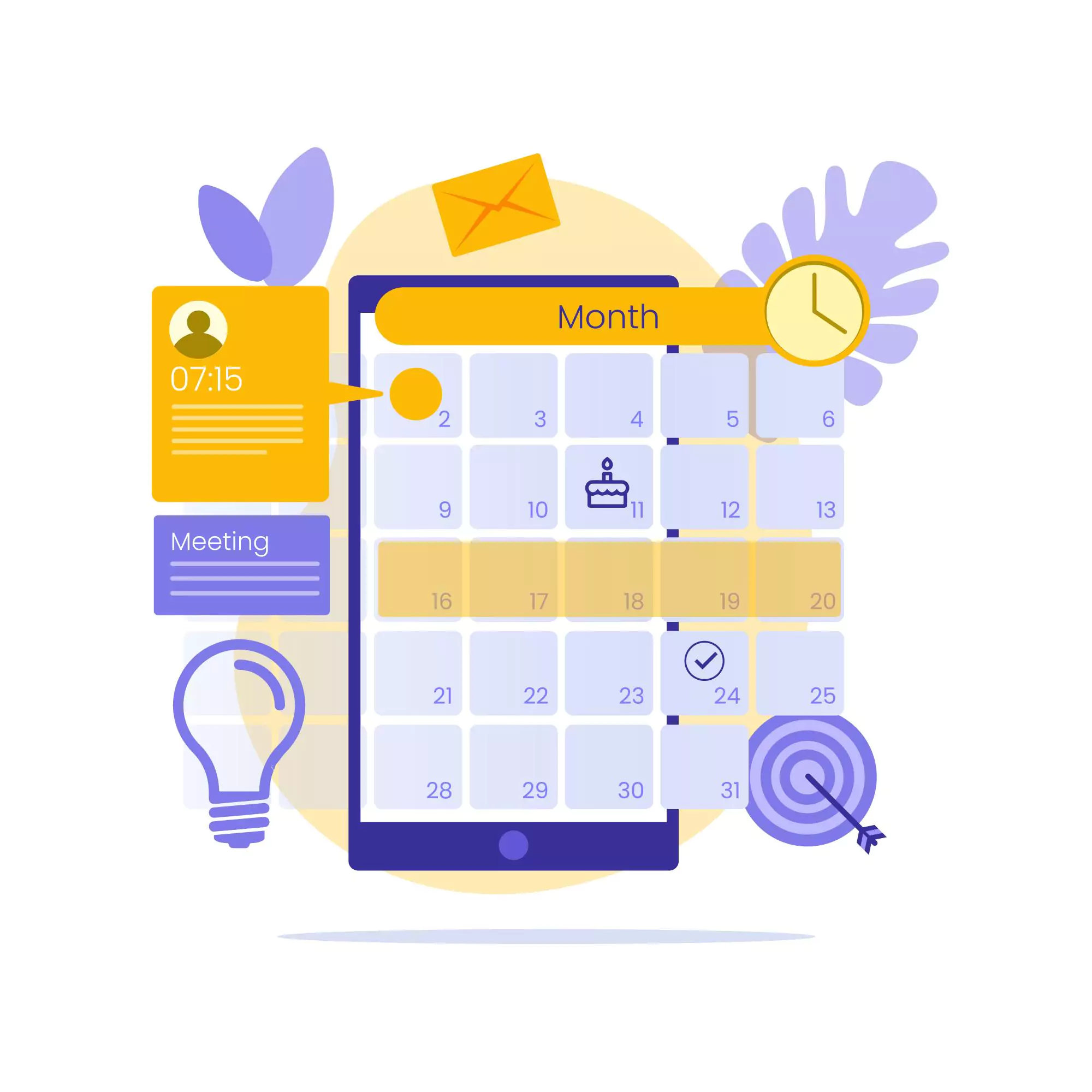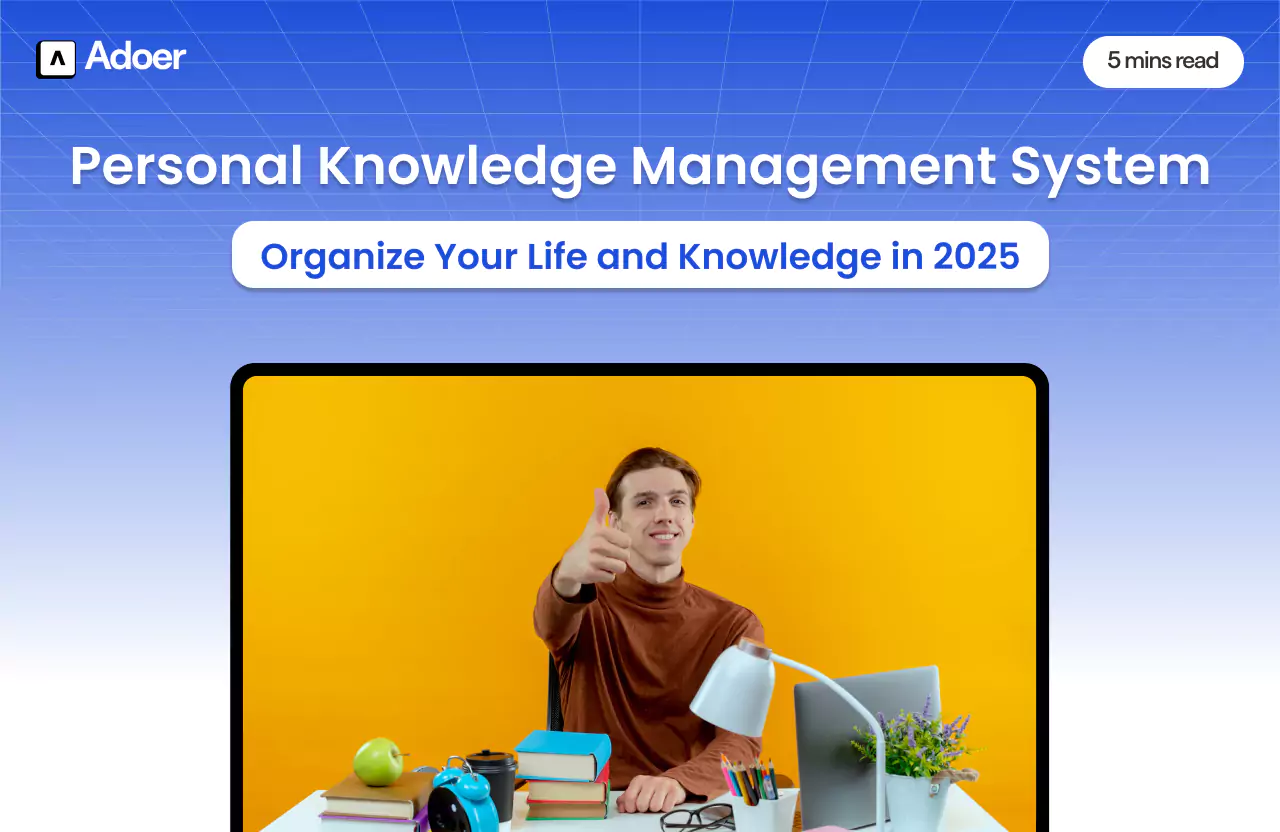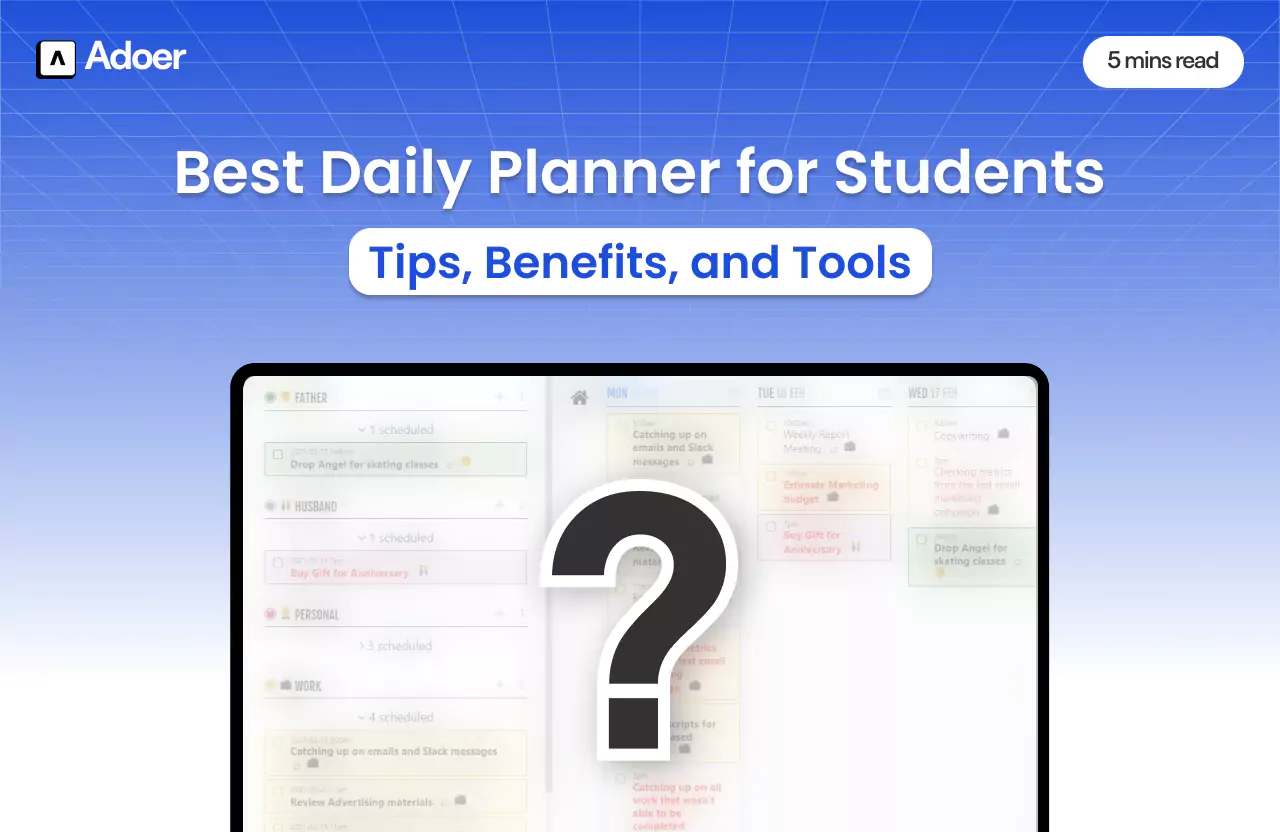Personal Knowledge Management System: Organize Your Life in 2025

Author
Shivang Khungar
Have you ever felt overwhelmed by the sheer amount of information in your life? A recent study shows that 75% of professionals spend more than an hour daily searching for misplaced information.
If that’s the case with you, a Personal Knowledge Management System (PKMS) can help.
In 2025, as our lives become increasingly fast-paced, managing information effectively has never been more crucial.
A well-designed PKMS helps you organize knowledge, save valuable time, and achieve your goals. Moreover, it simplifies how you access and retain important details.
By using the right tools and strategies, you can streamline your personal and professional life. So, let’s explore what a Personal Knowledge Management System is and how it can be a transformative tool for staying organized and productive.
What is a Personal Knowledge Management System?
A Personal Knowledge Management System is a structured method for capturing, organizing, and retrieving information. It’s like having a digital brain to store your ideas, note taking, and insights.
Whether you’re a student, professional, or lifelong learner, a PKMS helps you manage your intellectual resources effectively.

Why You Need a Personal Knowledge Management System
In today’s fast-paced world, information is everywhere. Without a proper system, it’s easy to lose track of important details. A well-structured system keeps you organized and focused.
It boosts your productivity and helps you retain valuable knowledge for personal and professional growth.
In fact, a survey found that 80% of respondents experience information overload, driven by constant information availability and too many apps to check.
Implementing a PKMS can help mitigate these challenges by providing a structured approach to managing information.
Benefits of Using a Personal Knowledge Management System
Better Organization
A Personal Knowledge Management System keeps your notes, documents, and ideas neatly organized. You can categorize information by topics, projects, or priorities, making it easier to find when needed.
Furthermore, this system ensures that nothing gets lost in the chaos, offering peace of mind and saving time when searching for critical details.
Transitioning to a PKMS helps you stay on top of your tasks effortlessly.
Improved Learning and Retention
When information is stored systematically, learning becomes more effective. With a Personal Knowledge Management System, you can revisit and review key concepts, helping you retain knowledge for the long term.
Additionally, regular reviews ensure you never forget important details. This method enhances your ability to connect new ideas with existing ones, reinforcing your understanding.
As you build your PKMS, your knowledge retention naturally improves.
Enhanced Productivity
A well-maintained Knowledge Repository saves time by eliminating the need to search endlessly for information. This efficiency allows you to focus on tasks that matter most, boosting your overall productivity.
Moreover, having a streamlined system reduces mental clutter, helping you approach projects with clarity. Transitioning seamlessly between tasks becomes easier with all your information at your fingertips.
Effective Decision-Making
A Personal Knowledge Management System aids in better decision-making by providing easy access to relevant information. When you can quickly retrieve supporting data or previous insights, making informed choices becomes second nature.
Over time, this habit leads to improved outcomes in both personal and professional settings. Additionally, the ability to review your knowledge consistently allows you to evaluate options more critically.
Core Components of a Personal Knowledge Management System
Information Capture
The first step of a Personal Knowledge Management System is capturing information. This includes notes, articles, and ideas. Moreover, tools like web clippers or voice-to-text apps make this process seamless and efficient.
As a result, you can collect valuable insights effortlessly and ensure nothing slips through the cracks.
Organization and Categorization
Organizing information is absolutely crucial. A Digital Knowledge Hub allows you to group related data under specific categories or tags.
Furthermore, this structured approach makes it easier to locate what you need when you need it.
Additionally, keeping your data well-organized reduces stress and improves your ability to focus on key tasks.
Retrieval and Search
A strong Personal Knowledge Management System includes a robust search function. With advanced search capabilities, you can quickly locate specific pieces of information, saving you valuable time.
Moreover, having a reliable search system ensures that even older data remains accessible when needed. As a result, you can work smarter, not harder.
Sharing and Collaboration
Sharing knowledge with colleagues or collaborators is an essential part of a Personal Knowledge Management System. Modern tools make it easy to share insights and work together efficiently.
Furthermore, this collaborative approach enhances team productivity and fosters better communication. Consequently, you can achieve more together while staying organized.

How to Build a Personal Knowledge Management System
Step 1 – Define Your Goals
To begin with, decide what you want to achieve with your Personal Knowledge Management System.
Are you organizing study materials, managing work projects, or tracking personal growth? Moreover, having clear goals makes it easier to design a system that works for you.
Step 2 – Choose the Right Tools
Next, select tools that align with your goals. Popular choices include Notion, Evernote, and Adoer. Additionally, ensure the tools you choose are user-friendly and support your workflow, helping you stay organized with ease.
Step 3 – Develop a Workflow
Furthermore, create a workflow for capturing, organizing, and retrieving information. A consistent routine helps keep your Personal Knowledge Management System effective and relevant. This way, you can quickly access and utilize the information you need.
Step 4 – Maintain and Review
Finally, regularly review and update your Personal Knowledge Management System. By doing so, you ensure your system stays current and continues to meet your evolving needs. In the end, a well-maintained system is key to long-term success.
Top Tools for Personal Knowledge Management Systems
Adoer
Adoer is a powerful daily planner designed to streamline your Personal Knowledge Management System. To begin with, it combines note-taking and task management into a single platform, making it incredibly versatile.
Moreover, Adoer offers features like adaptive UI, seamless syncing, and the ability to organize notes and tasks efficiently.
Its minimalistic design and adaptive UI ensure easy navigation. Thus, helping you focus on building and managing your knowledge base.
Ultimately, Adoer is an excellent choice for individuals and teams looking to simplify their ~~~~~~~~~~`Digital Brain for Information Retention.
Notion
Notion is an all-in-one solution for creating a Personal Knowledge Management System tailored to your needs. In addition, its customizable templates and flexible interface allow you to organize information your way.
You can create databases, project boards, or simple notes to suit any purpose. Moreover, Notion integrates seamlessly with other tools, ensuring a cohesive workflow.
Whether you're a student, professional, or creative, Notion provides a robust platform for managing your personal and professional knowledge.
Roam Research
Roam Research stands out in the realm of Personal Knowledge Management Systems with its unique graph database structure. To begin with, it helps you connect ideas effortlessly, creating a web of linked knowledge.
This tool is particularly useful for researchers, writers, and thinkers who rely on exploring relationships between concepts. Moreover, its intuitive backlinking system enables you to build a dynamic and evolving knowledge network.
Roam Research is perfect for anyone looking to track relationships and uncover patterns within their knowledge base.
Obsidian
Obsidian is a standout tool for those who value linking notes and creating interconnected knowledge webs. To begin with, it provides a local-first approach, ensuring complete control over your data.
Obsidian’s markdown-based system allows for effortless note-taking and formatting. Moreover, its graph view offers a visual representation of your knowledge network, making it ideal for knowledge workers and researchers.
By focusing on connectivity, Obsidian empowers users to build a robust Personal Knowledge Management System that evolves with their learning and exploration.
Evernote
Evernote remains a trusted name in Personal Knowledge Management Systems, offering reliable features for capturing and organizing information. To begin with, it provides powerful tools for note-taking, web clipping, and document storage.
Evernote’s robust search functionality allows you to find information quickly, even within handwritten notes or PDFs. Moreover, its seamless integration with other apps ensures that your knowledge management system is always connected.
Whether for personal or professional use, Evernote offers a comprehensive solution to organize your ideas and tasks.
These tools provide diverse features to create and manage your Personal Knowledge Management System, empowering you to organize and expand your knowledge effectively.

Best Practices for Using a Personal Knowledge Management System
Keep It Simple
To begin with, don’t overcomplicate your Personal Wiki. A straightforward and intuitive system is easier to maintain and far more effective in the long run.
Be Consistent
Moreover, consistency is key to success. Regularly update your system and stick to your workflow. By doing so, you ensure that your system remains reliable and useful.
Regularly Update Your System
In addition, make it a habit to review and refresh your Personal Knowledge Management System. This way, it stays aligned with your goals and remains an indispensable resource over time.
Common Challenges with Personal Knowledge Management System and How to Overcome Them
Over-organization
To begin with, avoid overcomplicating your system by adding too many categories or tags. Instead, keep it simple and intuitive for easier navigation.
Inconsistent Updates
Furthermore, inconsistent updates can make your system less effective. To prevent this, set a regular routine for maintenance. Regular updates keep your system relevant and accurate.
Tool Overlap
Lastly, using too many tools can be overwhelming and counterproductive. Instead, focus on a few key tools that meet your needs effectively, ensuring a streamlined experience.
Why Adoer is the Best Personal Knowledge Management System
Adoer is a digital planner that stands out as the ultimate Personal Knowledge Management System for its versatility and user-friendly features.
How adaptive is Adoer Ui ? Adoer adapts to your workflow, offering seamless organization and instant access to notes. Moreover, Adoer supports seamless syncing, ensuring your data is always up-to-date across devices.
Its minimalistic design reduces complexity, allowing users to focus on building their knowledge base.
Ultimately, Adoer’s unique features make it the ideal Personal Knowledge Management System for individuals and teams aiming to streamline learning and productivity.
Conclusion
A Personal Knowledge Management System is indispensable for organizing your life and managing knowledge effectively in 2025.
By choosing the right tools and practices, you can create a system that boosts productivity and simplifies management.
Moreover, an efficient system empowers you to access, connect, and utilize knowledge effortlessly. Start building your PKMS with Adoer, try it now and transform how you manage knowledge!
FAQs About PKMS
1. What is a Personal Knowledge Management System?
A PKMS organizes, stores, and retrieves your knowledge for better productivity.
2. How do I choose the best tool for my Personal Knowledge Management System?
Choose a tool that suits your workflow, offers seamless syncing, and enhances your PKMS.
3. Can I use multiple tools in my Personal Knowledge Management System?
Yes, combining tools like Adoer, Notion, and Evernote enhances your PKMS flexibility.
4. How often should I update my PKMS?
Regularly update your PKMS to keep information relevant, organized, and easily accessible.




